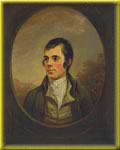
Burns Night

Each year on January 25, Scots all around the World take the time to honour a national icon. Whether it's a full-blown Burns Supper or a quiet night of reading poetry, Burns Night is a night for all Scots!
Robert "Robbie" Burns was born on January 25, 1759 into the family of a peasant farmer in the southwest Scotland. Burns himself took up farming at a young age but had no success; thusly he decided to begin writing poems for local circulation. Soon, he decided to have them published in a book in the small town of Kilmarnock. Copies of the Kilmarnock edition reached the Scottish Capital, Edinburgh, and the intellectuals there were impressed right away. Most of Burn's poems were short, lyrical pieces but they became an instant hit.
Robert Burns has became most admired for having spoken the manner of the common person and for his native lyrical understanding. His poems celebrate the natural love between a man and woman, the enjoyment of sociable drinking and the pride of the self-reliant man and woman.
Among Burn's many poems is one called "Address To a Haggis," in which he describes the dish as that "Great chieftain O' the puddin'-race." Naturally, haggis must be served at the party. Haggis tastes slightly like hash. It is made from the heart, liver and lungs of a sheep. These organs are finely chopped and mixed with toasted oatmeal, onions, and seasonings. Then everything is boiled in a bag made from the sheep's stomach, it sounds worst than it actually tastes.
"Fair fa' your honest, sonsie
face,
Great chieftain o the puddin'-race!
Aboon them a' ye tak your place,
Painch, tripe, or thairm:
Weel are ye wordy of a grace
As lang's my arm."
If you are planning to celebrate the birthday of Robert Burns below are some traditional dishes that you'll need to serve and can always be found a a Burns night supper:
Haggis
Neeps (Turnip)
Tatties (Potatoes)
Another of Burn's famous poems is one that is sang all around the World at Midnight on the 31st of December each yearby millions of people all around the World, of course the poem is "Auld Lang Syne". The name translates literally from old Scottish dialect and means "Old Long Ago" and is about past loves and friendships.
"For old lang syne, my dear,
For old lang syne,
We'll tak a cup o' kindness yet,
For old lang syne."